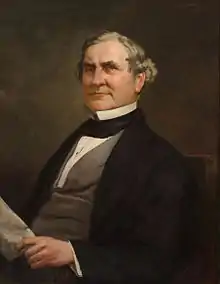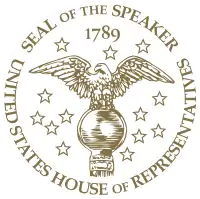William Pennington
William Pennington (May 4, 1796 – February 16, 1862) was an American politician and lawyer. He was the Governor of New Jersey from 1837 to 1843. He served one term in the United States House of Representatives, during which he served as Speaker of the House from 1860 to 1861.
William Pennington | |
|---|---|
 | |
| 23rd Speaker of the United States House of Representatives | |
| In office February 1, 1860 – March 3, 1861 | |
| Preceded by | James L. Orr |
| Succeeded by | Galusha A. Grow |
| Leader of the House Republican Conference | |
| In office February 1, 1860 – March 3, 1861 | |
| Preceded by | Office Established |
| Succeeded by | Galusha A. Grow |
| Member of the U.S. House of Representatives from New Jersey's 5th district | |
| In office March 4, 1859 – March 3, 1861 | |
| Preceded by | Jacob R. Wortendyke |
| Succeeded by | Nehemiah Perry |
| 13th Governor of New Jersey | |
| In office October 27, 1837 – October 27, 1843 | |
| Preceded by | Philemon Dickerson |
| Succeeded by | Daniel Haines |
| Member of the New Jersey General Assembly | |
| In office 1828 | |
| Personal details | |
| Born | May 4, 1796 Newark, New Jersey |
| Died | February 16, 1862 (aged 65) Newark, New Jersey |
| Political party | Republican |
| Alma mater | Princeton College |
| Profession | Law |
Early life and education
Born in Newark, New Jersey, he graduated from the College of New Jersey (now Princeton University) in 1813 and then studied law with Theodore Frelinghuysen. He was admitted to the bar in 1817 and served as a clerk of the United States District Court for the District of New Jersey (where his father was a judge) from 1817 to 1826.
Governor of New Jersey
As a member of the Whig party, he was elected to the New Jersey General Assembly in 1828, and then was elected Governor of New Jersey annually from 1837 to 1843. His tenure as governor was marked by the "Broad Seal War" controversy. Following a disputed election for Congressional Representatives in New Jersey, Pennington certified the election of five Whig candidates while five Democrats were certified by the Democratic Secretary of State. After a lengthy dispute, the Democrats were eventually seated.
Speaker of the U.S. House of Representatives
In November 1858, Pennington was elected as a Republican to represent New Jersey's 5th congressional district in the U.S. House of Representatives during the 36th Congress but only after a protracted election for speaker of the House of Representatives lasting 44 ballots over eight weeks (December 5, 1859 to February 1, 1860).[1] It was the third time since 1789 that the House elected a freshman congressmen as its speaker (after Frederick Muhlenberg in 1789 and Henry Clay in 1811); the feat has not been repeated since.[2]
In March 1861, he penned his name on the Corwin Amendment, a proposed amendment to the U.S. Constitution shielding state "domestic institutions" (a euphemism for slavery) from future constitutional amendments and from abolition or interference by Congress. Submitted to the states for ratification shortly before the outbreak of the American Civil War, it was not ratified by the requisite number of states.
Death
After running unsuccessfully for reelection in 1860 to the 37th Congress, he returned to New Jersey, where died in Newark of an unintentional morphine overdose.[3] He was interred at Mount Pleasant Cemetery in Newark.
See also
- List of Governors of New Jersey
References
- "Speaker Elections Decided by Multiple Ballots". history.house.gov. United States House of Representatives. Retrieved February 18, 2019.
- Heitshusen, Valerie (February 11, 2011). "The Speaker of the House: House Officer, Party Leader, and Representative" (PDF). CRS Report for Congress. Washington, D.C.: Congressional Research Service, the Library of Congress. Retrieved February 18, 2019.
- Rojas, Warren (October 8, 2015). "'Interim Speaker' Stumps Scholars". Roll Call. Washington, DC.
Sources
- United States Congress. "William Pennington (id: P000214)". Biographical Directory of the United States Congress.
- New Jersey Historical Commission biography for William Pennington
- New Jersey Governor William Pennington, National Governors Association
- William Pennington biography from The Political Graveyard
- "William Pennington". Webster's American Biographies. G. & C. Merriam Company. 1975.
| Political offices | ||
|---|---|---|
| Preceded by Philemon Dickerson |
Governor of New Jersey October 27, 1837 – October 27, 1843 |
Succeeded by Daniel Haines |
| Preceded by James L. Orr |
Speaker of the U.S. House of Representatives February 1, 1860 – March 4, 1861 |
Succeeded by Galusha A. Grow |
| U.S. House of Representatives | ||
| Preceded by Jacob R. Wortendyke |
Member of the U.S. House of Representatives from New Jersey's 5th congressional district March 4, 1859 – March 4, 1861 |
Succeeded by Nehemiah Perry |

